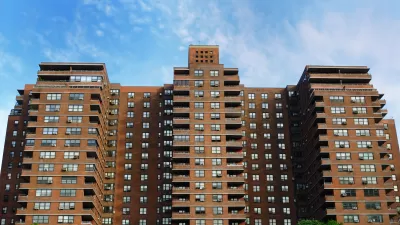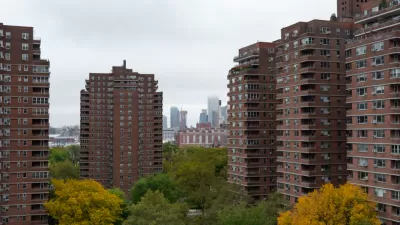Conventional planning think says that mixed-income development benefits low-income neighborhoods. But a survey finds that residents of public housing in New York don't agree—rather, they feel left behind by newcomers to the neighborhood.
Greg B. Smith reports on a study by Abt Associates and New York University's Furman Center for Real Estate, commissioned by the city of New York, about the impacts of gentrification on residents of New York City Housing Authority buildings. According to Smith, the report "reached a conclusion most New Yorkers already accept as true: gentrification doesn't help the poor."
"The study, 'The Effects of Neighborhood Change on NYCHA Residents' [pdf]…found that NYCHA tenants often wind up feeling like aliens in their own neighborhoods, surrounded by newcomers who claimed they'd just 'discovered' the neighborhood."
The study, released in May, runs counter to the narrative about the benefits of developing new mixed-income housing in low-income neighborhoods. During the same month, the de Blasio Administration announced "a controversial plan to build hundreds of market-rate apartments on 'underutilized' NYCHA property," according to Smith.
NYCHA spokesperson Aja Worthy-Davis noticed the difference, releasing this statement about the goals of the proposal to build more units on NYCHA properties: "By building both affordable and mixed-income housing, we will protect NYCHA housing, expand affordable housing options for everyday New Yorkers, and bring small businesses and services like supermarkets and restaurants closer to NYCHA developments….We will in turn use this growth to connect NYCHA residents to new employment opportunities."
The article includes a lot more detail about the study and its implications for New York and on the debate about investment in low-income neighborhoods.
FULL STORY: EXCLUSIVE: NYCHA residents see little benefit from gentrification in their neighborhoods, report shows

Planetizen Federal Action Tracker
A weekly monitor of how Trump’s orders and actions are impacting planners and planning in America.

Map: Where Senate Republicans Want to Sell Your Public Lands
For public land advocates, the Senate Republicans’ proposal to sell millions of acres of public land in the West is “the biggest fight of their careers.”

Restaurant Patios Were a Pandemic Win — Why Were They so Hard to Keep?
Social distancing requirements and changes in travel patterns prompted cities to pilot new uses for street and sidewalk space. Then it got complicated.

California Homeless Arrests, Citations Spike After Ruling
An investigation reveals that anti-homeless actions increased up to 500% after Grants Pass v. Johnson — even in cities claiming no policy change.

Albuquerque Route 66 Motels Become Affordable Housing
A $4 million city fund is incentivizing developers to breathe new life into derelict midcentury motels.

DC Area County Eliminates Bus Fares
Montgomery County joins a growing trend of making transit free.
Urban Design for Planners 1: Software Tools
This six-course series explores essential urban design concepts using open source software and equips planners with the tools they need to participate fully in the urban design process.
Planning for Universal Design
Learn the tools for implementing Universal Design in planning regulations.
Heyer Gruel & Associates PA
JM Goldson LLC
Custer County Colorado
City of Camden Redevelopment Agency
City of Astoria
Transportation Research & Education Center (TREC) at Portland State University
Camden Redevelopment Agency
City of Claremont
Municipality of Princeton (NJ)




























